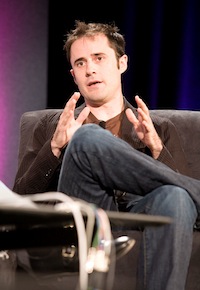
The test, Williams said, is that your product or service should be the end of a sentence that begins, “Wouldn’t it be awesome if …?” And that sentence shouldn’t be, “Wouldn’t it be awesome if I had a million dollars?”
[aditude-amp id="flyingcarpet" targeting='{"env":"staging","page_type":"article","post_id":168194,"post_type":"story","post_chan":"none","tags":null,"ai":false,"category":"none","all_categories":"business,social,","session":"C"}']Williams said he’s the kind of entrepreneur motivated by “creating things in the world that didn’t exist before,” but he acknowledged that there are others who are more motivated to make money. (And Twitter-haters might argue that if Williams had been a little more interested in money, the company might have found a business model by now.) So perhaps it’s best to think of this as “advice for entrepreneurs who want to be like Evan Williams.”
He also said he encourages entrepreneurs to not just think big, but also to think differently. Sometimes that can be hard if you’re in Silicon Valley — it’s a great area to build a technology company, but it’s easy to get locked into the Valley mindset, he said (though he didn’t offer many details about what that mindset entails).
AI Weekly
The must-read newsletter for AI and Big Data industry written by Khari Johnson, Kyle Wiggers, and Seth Colaner.
Included with VentureBeat Insider and VentureBeat VIP memberships.
“A lot of the most interesting companies come outside of Silicon Valley,” Williams said. Offering Chicago-based companies 37Signals and Threadless as examples, he said, “They’re not sucked into the thinking of Silicon Valley.”
VentureBeat's mission is to be a digital town square for technical decision-makers to gain knowledge about transformative enterprise technology and transact. Learn More
